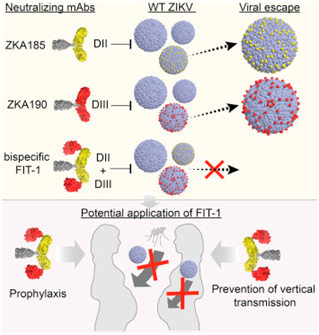中国病毒学论坛|我们一直在坚持!
标题: Cell:人双特异性抗体FIT-1具有治疗寨卡病毒感染的潜力 [打印本页]
作者: ipsvirus 时间: 2017-9-24 14:20
标题: Cell:人双特异性抗体FIT-1具有治疗寨卡病毒感染的潜力
图片来自Cell, doi:10.1016/j.cell.2017.09.002
在一项新的研究中,来自新加坡、瑞士、美国、英国和意大利的研究人员发布了利用一种双特异性抗体抵抗寨卡病毒感染的数据。相关研究结果发表在2017年9月21日的Cell期刊上,论文标题为“A Human Bi-specific Antibody against Zika Virus with High Therapeutic Potential”。论文通信作者为杜克-新加坡国立大学的Shee-Mei Lok、瑞士意大利语区大学的Luca Varani和瑞士Humabs BioMed公司的Davide Corti。
这种被称作FIT-1的双特异性抗体将两种人抗体ZKA190和ZKA185的特异性结合在一起,并且是利用Humabs BioMed公司的专利技术CellClone设计出来的。ZKA190是一种强效的寨卡病毒中和抗体,经证实它结合到这种病毒颗粒的所有表面E蛋白上,而且能够让这种病毒的四级结构变形;ZKA185结合到这种病毒表面上的一种明显不同的位点上,有助阻止这种病毒逃脱。这些研究人员证实,FIT-1强效地中和从全世界分离出的寨卡病毒毒株,而且寨卡病毒不能够逃脱它。
这些研究人员将[color=rgb(16, 78, 129) !important]实验技术和计算技术结合在一起理解FIT-1如何阻断这种感染周期,从而阐明这种病毒与这种双特异性抗体之间的相互作用。这项研究利用最近开发的IRB NMR机器阐明抗体特征。
Lok团队在液氮温度下利用电子显微成像技术在高放大倍数下研究ZKA190抗体对寨卡病毒的结合影响。经观察,ZKA190破坏寨卡病毒颗粒的表面结构,因而解释了它为何强效地清除这种病毒。但是在ZKA190的存在下,寨卡病毒无论在体内还是在体外都可通过发生突变逃避这种抗体。
为了解决这个问题,这些研究人员开发出双特异性抗体FIT-1。他们还在动物模型中通过在三个不同的时间点(在感染后第一天、第二天和第三天)注射三种不同剂量(15 mg/kg、5 mg/kg和1 mg/kg)的FIT-1,在体内评估这种双特异性抗体的治疗潜力。尽管所有剂量都具有抵抗感染的能力,但是最高剂量(15 mg/kg)的FIT-1导致100%的存活率,而且没有表现出发病的迹象,即便是在感染后第三天注射FIT-1,也是如此。在感染后第五天进行测量时,不论注射其中的任何一种剂量,都未检测到寨卡病毒逃脱。
Varani说,“我们证实寨卡病毒具有显著的改变和逃避人类免疫反应的能力。我们设计出FIT-1双特异性抗体来克服这个问题。我们的研究团队之间的强强合作允许我们从原子相互作用、分子水平、细胞水平到最终的整个人体水平上描述寨卡病毒与免疫系统之间的相互作用。我们报道的这些数据支持我们的设计假设,并且为将FIT-1用于临床治疗提供一种坚实的基础。”
(生物谷 Bioon.com)
作者: ipsvirus 时间: 2017-9-24 14:22
A Human Bi-specific Antibody against Zika Virus with High Therapeutic Potential
Jiaqi Wang1, 2, 11, Marco Bardelli3, 11, Diego A. Espinosa4, Mattia Pedotti3, Thiam-Seng Ng1, 2, Siro Bianchi5, Luca Simonelli3, Elisa X.Y. Lim1, 2, Mathilde Foglierini3, Fabrizia Zatta5, Stefano Jaconi5, Martina Beltramello5, Elisabetta Cameroni5, Guntur Fibriansah1, 2, Jian Shi2, 6, Taylor Barca4, Isabel Pagani7, Alicia Rubio7, Vania Broccoli7, 8, Elisa Vicenzi7, Victoria Graham9, Steven Pullan9, Stuart Dowall9, Roger Hewson9, Simon Jurt10, Oliver Zerbe10, Karin Stettler5, Antonio Lanzavecchia3, Federica Sallusto3, Andrea Cavalli3, Eva Harris4, Shee-Mei Lok1, 2, 12, , , Luca Varani3, 12, , , Davide Corti
Zika virus (ZIKV), a mosquito-borne flavivirus, causes devastating congenital birth defects. We isolated a human monoclonal antibody (mAb), ZKA190, that potently cross-neutralizes multi-lineage ZIKV strains. ZKA190 is highly effective in vivo in preventing morbidity and mortality of ZIKV-infected mice. NMR and cryo-electron microscopy show its binding to an exposed epitope on DIII of the E protein. ZKA190 Fab binds all 180 E protein copies, altering the virus quaternary arrangement and surface curvature. However, ZIKV escape mutants emerged in vitro and in vivo in the presence of ZKA190, as well as of other neutralizing mAbs. To counter this problem, we developed a bispecific antibody (FIT-1) comprising ZKA190 and a second mAb specific for DII of E protein. In addition to retaining high in vitro and in vivo potencies, FIT-1 robustly prevented viral escape, warranting its development as a ZIKV immunotherapy.
http://www.sciencedirect.com/sci ... i/S0092867417310516
| 欢迎光临 中国病毒学论坛|我们一直在坚持! (http://virology.com.cn/) |
Powered by Discuz! X3.2 |

